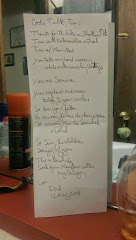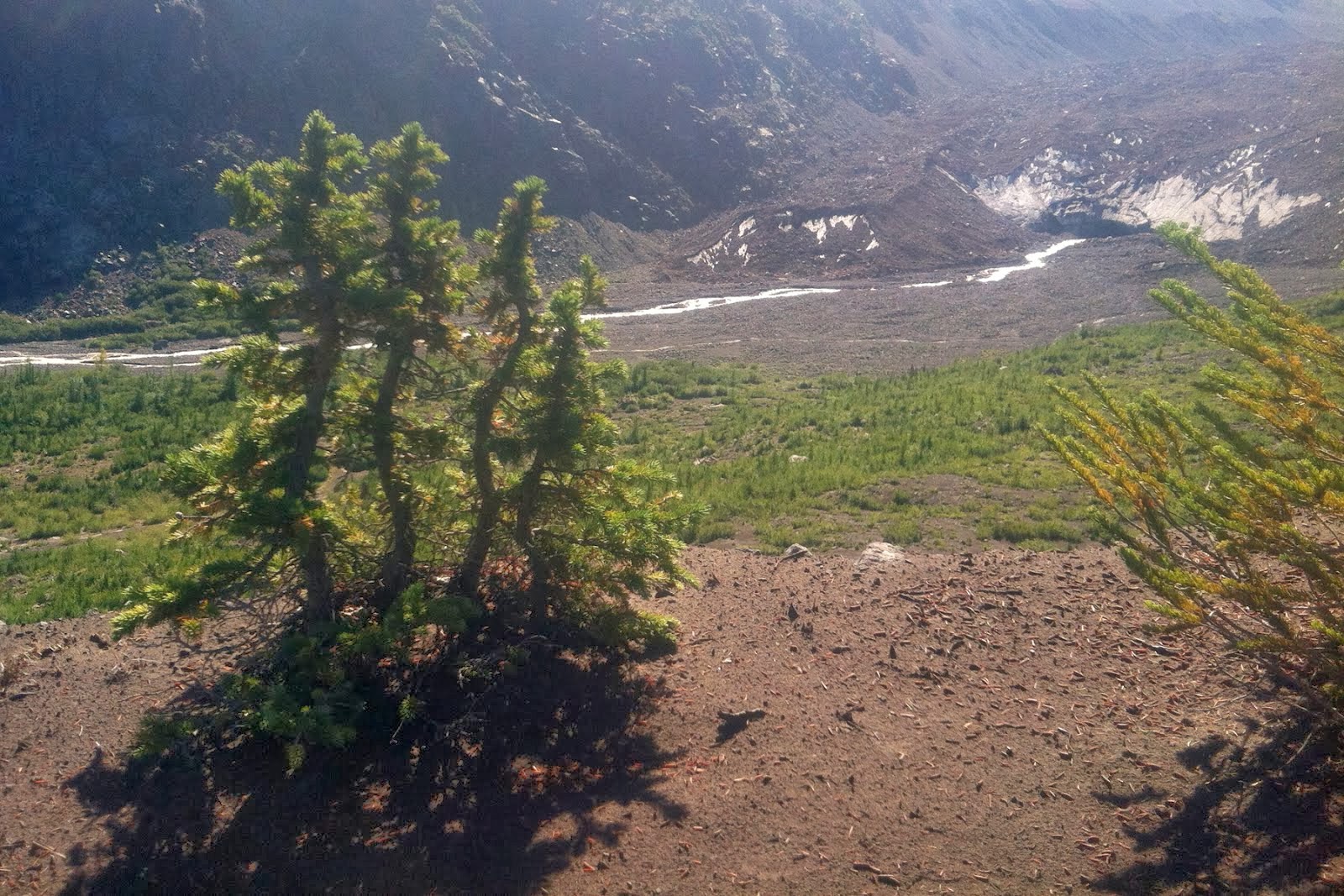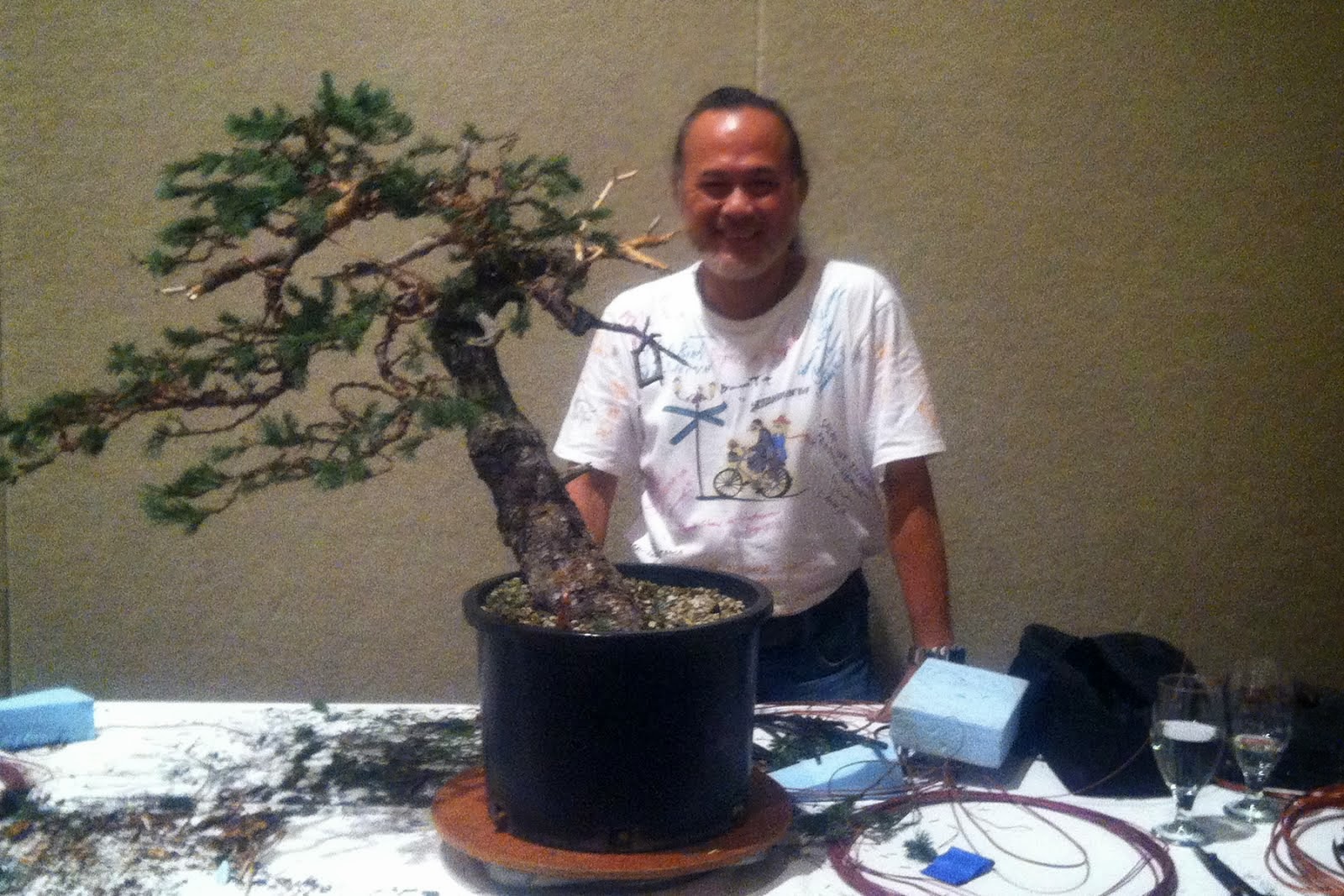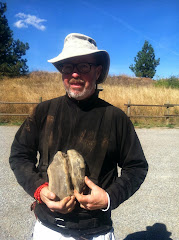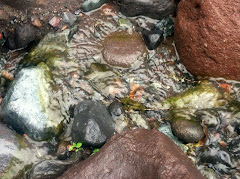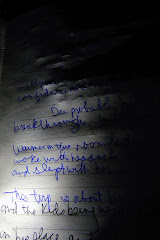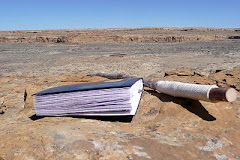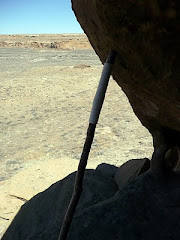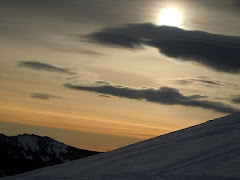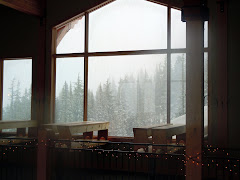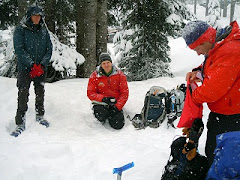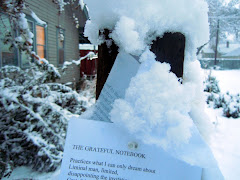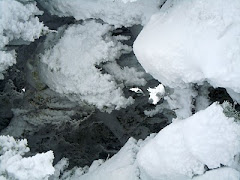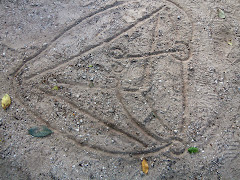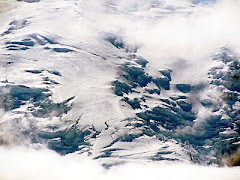AFTER BEING SHOCKED BY CONDITIONS AND COSTS
AT FOX RUN RV PARK IN WILLISTON NORTH DAKOTA OIL FIELDS,
THE WOMAN WHO KEEPS THINGS CLEANED STRAIGHTENS ME OUT
WHEN I ARRIVE AT COMMUNITY SHOWERS AFTER 8 PM
We’re closed. You’ll have to go to the main building.
OK, you have that shower pass, but this shower is closed.
You just came in. You’re on the end? In the camper?
I’ll tell you what.
I’m
Lisa. I’m from Colorado.
I miss the mountains. Did I say I miss the mountains.
I’ll get this shower ready for you tonight.
We’re closed, but I’ll let you lock up.
Don’t let this place scare you.
We’re getting it cleaned up.
Workers come and go. That’s how it works.
These workers, a year ago, they gave me
their 5th wheel. It’s my mansion.
Just gave it to me. Saves me six thousand a year.
I had to get away for a while. Just had to get away.
For a while. I’ll go back. My son was a rough neck
for two years. Wife and three kids.
I asked him to come back and work with me.
He said, I’m so done with North Dakota,
I don’t think my body would let me back in.
That’s one well that’s not being drilled.
What’s a roughneck?
A roughneck’s one of the guys on a drilling crew.
You want to learn about the oil,
go online to Real Oil Field Bitches,
Oil Field Nation,
they’ll teach you what a roughneck is.
They’re married to roughnecks.
Worm, driller, company man. motor man, derrick hand, pole
pusher,
and that’s what it takes to run a drilling rig.
It’s tough being a rough neck. 12 on 12 off, weeks at a
time.
Away from families. And money? They make a lot of money.
But that phone call comes. The dreaded phone call.
Oilmen pumped the last stage on Eagle Ford last week.
Oilman is out of work like that. For now.
But this park, they’re working on the cleanup.
New management. 24 cameras. Cameras everywhere.
Keep the druggies out. And the mudrooms.
Some of these mudrooms were built before I came.
They’re for insulation around the trailers,
but they’re rooms, too. No they’re not for dirty boots.
Some trailers have 3 bedroom mudrooms.
Fire marshall like to have a fit.
No more mudrooms he said.
It is expensive here. I’ll give you that.
But it’s going to be safe.
Jim Bodeen
15-16 October 2015
Fox Run RV Park
Williston Oil Fields
THE PARK AT WOLF POINT
We drive into Wolf Point at lunchtime,
park’s right there on the HiLine.
Pull in and there’s the story of Wolf Point
on the storyboard. Wolf Point started out
as a trading post with Fort Peck Reservation
in late 1800s. Lewis and Clark stopped
in late spring 1805. We stop every time
we drive the HiLine. Wolf Point is half-way
point between Bismark and Fort Benton.
Six men huddle on the picnic bench in hooded sweatshirts.
HiWay 2 is Main Street in Wolf Point.
What is this something that tells us
to stop and look? I break out the Coleman
two burner, get the hamburger and onions going.
Zip my coat and open the notebook.
Onions in that frying pan send out messages, too.
When I add a can of black beans
one man leaves the table of men
and walks over, asks, What’s up?
Tacos, I say. It’s getting cold, bro.
I’m going to need a winter jacket.
First we’re going to eat tacos.
Wolf Point gets its name
from trappers who killed stacked frozen carcasses
here for the winter—hundreds of wolves
observed by men heading up river on a steamboat.
It doesn’t take long to get a story going about books.
This is keeping the wolf from the door.
Before long, six men stand around the frying pan
as Karen brings out hot tortillas.
We’re talking literature in the park
and eating tacos. They know the Hi-Line
to street names in Wapato and Yakima.
Wolf Point on the Fort Peck Reservation
knows its way back and forth from here to there
These are Lakota and Dakota men living
on the street, brother and uncle,
teaching us dialect differences, translating.
Don says, Those things that happen
in Stephen King’s novels are too wild, Man.
Things don’t happen like that. They’re telling us.
Street and alcohol, pointing to the unheated
quanset hut where they sleep. Yes,
Stephen King’s a good man, Don says.
Nearer my age than the others,
left arm gone, coat sleeve dangling,
we’re both veterans. He continues,
I like House of Dawn. N. Scott Momaday
he tells a true story. How things happen.
How we all keep the wolf from the door.
Wolf Point starts with a story
and leads to this picnic table in mid-October.
A book open on the table tells the story of Bagese
who becomes a bear in Gerald Vizener’s story, Shadows.
Bagese says tribal stories must be told, not recorded.
And told to listeners, not readers.
Told through the ear and not the eye.
This is traffic and trade.
There’s an argument to be made
that we’re all mixed blood.
That’s what we’re doing around this table,
cleaning up. We’re telling what we’re thankful for,
this back and forth, the break in the road.
The chance of meeting here
and knowing the streets
where each of us comes from.
This is literature from the trading post.
The men are praying for us in Lakota.
They’re translating while I wrap
the last of the tacos in paper towels.
Wolf Point tacos kept warm
in the pockets of sweat shirts.
Jim Bodeen
14 October —19 October 2015
Wolf Point, Montana--Washburn, North Dakota
LINES BEFORE CRAWLING INTO BED
These are the sounds of the trains
running the prairies, stopping for the night.
These are the cars parked on rails
by the elevators. These,
the deep images of my childhood,
railroad cars coupling and uncoupling.
Steel wheel on steel rail,
braking, surging,
that harsh, high note,
songs come from the dark.
Jim Bodeen
14 October 2014
Havre, Montana
HiWay 2
CHANGING DRIVERS IN TROY, MONTANA
Door of Hope Gospel Church,
in front of me as
I get out
of the truck. Its red trim
on all windows, newly painted
like the Door of Hope it is.
New paint covers humility
with humility, matching
the houses on its block
in quiet proclamation.
Fanny Howe proclaims
in my notebook, Love
means
pressed between God
and God—
Blessed means
pressed there too.
I carry William Tyndale’s New Testament
with me where I go. His 1534 translation
written on the run. “Knock
and the door shall be opened,”
Tyndale’s words. He wanted
a Bible in English, words a plowman
could understand. He
was executed for his devotion.
Denied his place
in 16th Century learning,
his Jesus lives in Troy, Montana,
and so does he. Leaving Troy,
I drive through stone uplifted
a billion and a half years ago,
a man cupping his hands
before the newly painted
window, trying to see inside.
A man standing outside,
pressed against a notebook.
Jim Bodeen
13-14 October
Troy Montana—Havre, Montana
HOW THE GREAT CHANGE
CAME TO THE MOTHERSHIP
Checking in at Hi Dee Ho RV Park
in Sandpoint, I’m not thinking David Thompson
or exploration, but walk to the chain link fence
where the Canadian Pacific Soo Line
calls me with its whistle.
I want the whistle in my dream
come from a North Dakota childhood,
HiLine roots, sleeping in a safe house
where my grandma lived.
I carry a camera that records sounds
I call songs on any resúmé.
Karen directs the mothership
to a numbered spot beside a pickup
loaded with furniture and old tires.
“This is North Idaho,
what did you expect,” she says.
After a shower,
50 cents for seven minutes,
I tell her I turned the water off
half way through. It felt like a waste.
We’ve been with family,
our oldest living relatives,
who came out West on Amtrak.
We took them to the depot
before driving on,
going east ourselves into a heartland
completely emptied of family,
to explore forgotten places
for remnants, for traces
we don’t know we can recognize.
Part of my history is here on HiWay 2.
Grandpa Charlie met the train
when the whistle blew, hauling freight.
I rode in the back of his truck
before we left the North Dakota town
in shame when I still played trombone
in the school band.
If Northern Idaho
is Second Amendment country,
the town I come carries God
calling me through the poem
across 60 years of exile.
God stories carrying me
from omniscience to objectivity.
Carrying me around the world
and back in verse and translation.
In and out of the ordinary.
Back and forth in wonder.
Traveling this way, I learned
to cross over and cross back,
returning as an old man
to a kind of ascendant innocence.
Jesus for plowmen and William Blake
in my time, in my ordinary.
Rural church and rural door.
Itinerant preachers before a hard to find people.
Carrying questions that must be disposed of
before entering, Holding words
before those already practicing re-formation.
Rapid, inescapable. Inter-national.
Once you cross the border,
the Mexican poet says, you don’t go back.
HiWay 2 is two lanes, dangerous,
full of white crosses carrying,
among other things, the voice
of my mother, dream images
that won’t leave me alone.
Theologians say what separates us is crevasse.
Cultural commutes we can’t change clothes for.
And me, I’m road-called. Dirt road, back road—
going back and on my way.
Carrying notebooks and cameras.
Trained by the world
until I can hear every note
coming up from my mother.
Called at that level. And heard.
The logging truck passes us.
Iris DeMent sings poems of Anna Akmatova.
Iris DeMent is the jewel of the gem state.
She’s singing while turkeys cross the road.
Kootenai Casino says,
Take our money and run.
What’s that? Karen asks.
Last stop for cheap cigarettes.
The man at Kootenai Falls tells us
that low water level makes it possible
to walk out to the island
where folds resulting from East-West compression
were deposited a billion and a half years ago.
This is thrust faulting. Where one side
slides over another caused by compression.
Rocks here formed in an ancient island sea.
Fossils are stromatolites,
lichen visible as concentric rings on rocks.
You’re walking on the first life forms
the man says. Are you a geologist?
I ask. No, but we’re all geologists
when we leave here.
And what about these stones, I ask.
Is it legal to take stones for the garden?
You can take as many stones out of here
as you can carry, he says.
This is the suspension bridge we stand before.
Kootenai Falls, the most sacred spot
of the Kootenai People.
Seven bands. Five in British Columbia,
one in Idaho, and one in Montana.
So the man telling the story of the stones
doesn’t know the story of the people of the stones.
Slow down, story ears.
Ice age glaciers dam the river.
This is not a ferry crossing.
Telling-Half-The-Story walks
in a fragile meadow when he says,
Take as many stones as you can carry.
He steps on a world he doesn’t understand.
The storyboard at the Falls gives us an activity.
Look for something in your vehicle
you can fold—a piece of paper, a t-shirt.
Mimic the way rocks fold in stair-step fashion
to form Kootenai Falls.
The Mothership is a dream zendo
connected and un-connected.
A telegraph network in cyberspace.
I do not know. This call—
my work, is transmission,
not creation. This is a recording
of a day’s drive on HiWay 2.
A man sends me a poem by a young woman.
I read it a sentence at a time,
the way it is written.
And through the poem standing alone
enter the Dakota 38,
who take me to the movie,
that takes me to the 38 plus 2,
and the dream of Jim Miller,
who in the movie says this,
In 2005, when I
received this dream,
as any recovered
alcoholic,
I made believe that
I didn’t get it.
I tried to put it
out of my mind
but it was one of
those dreams
that bother you
night and day.
Here we are given a showing.
This is the visual of a call.
This is how Jim Miller
comes into my life.
He brings with him
the Dakota 38 plus 2.
He establishes the reformation
in the Mothership.
“We’re gonna be the first ones
to ask for forgiveness.”
Jim Bodeen
12 October-14 October 2015
Sand Point, SunDance, Havre
HiWay 2
Kootenai Falls
COMFORTED, NOT STILLED
Across the street from the train,
the engines enter the Mothership
warming up before the run
across the prairie.
The jacks are down
stabilizing us,
but not enough
that we’re not rocked
back and forth.
Lulled.
Awakened.
Something, something
Jim Bodeen
14 October 2015
Havre, Montana
HiWay 2
“DO I DARE?” KAREN ASKS,
pulling in to the river access,
braking to a stop, our eyes on golden Larches
reflected in still water of early morning.
I walk under the highway bridge
where the larches light up the camera.
Karen says, There’s a message and a relapse.
Did you see the cave?
Jeffrey Foucault sings Paradise
as I re-enter the cab.
Thank you for believing what I can’t believe.
This is the Middle Fork of the Flat Head River.
This is being alone in Glacier Park in October.
Jim Bodeen
14 October 2014

























